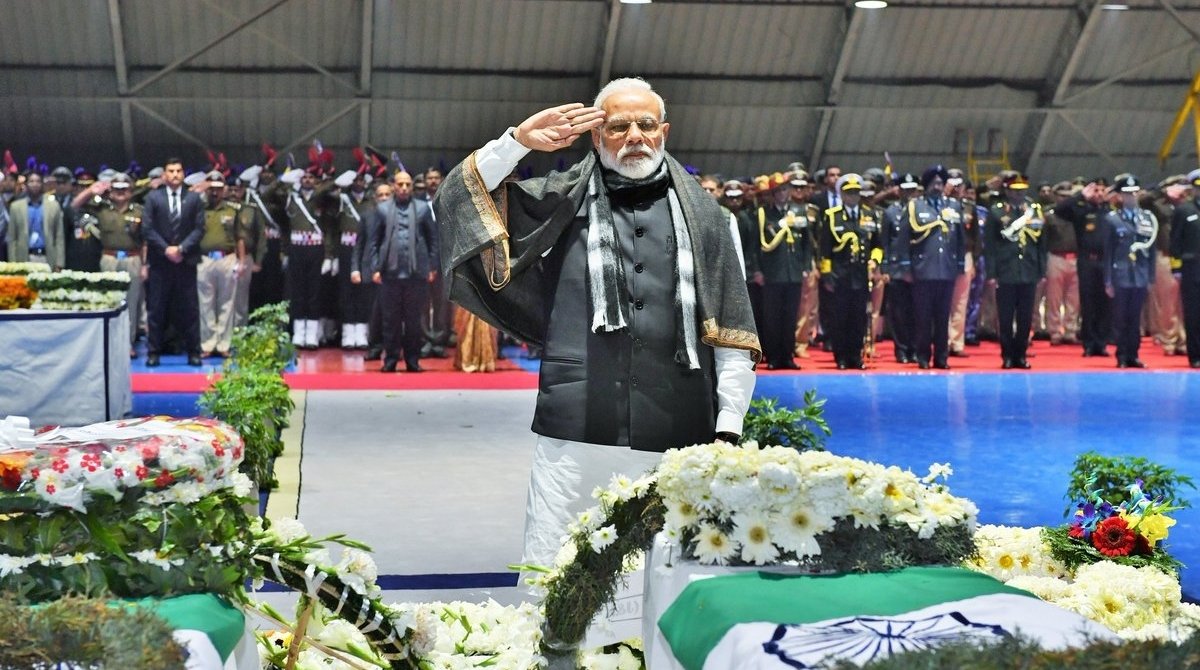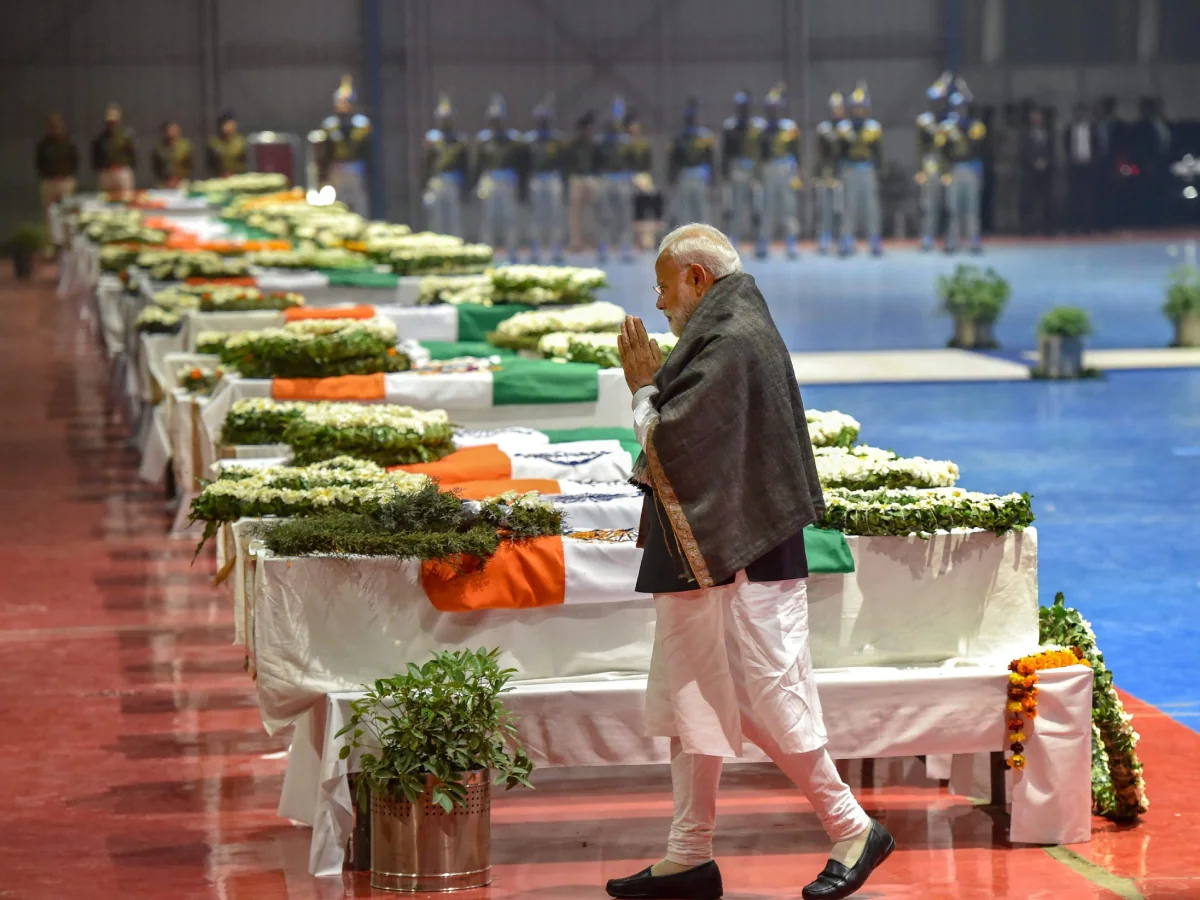February 14 is globally recognized as Valentine’s Day, a day celebrating love and togetherness. However, in India, this date holds a much deeper and tragic significance. It is observed as a Black Day in memory of the Pulwama terror attack that took place on February 14, 2019. On this day, 40 Central Reserve Police Force (CRPF) personnel lost their lives in a brutal terrorist attack in Pulwama, Jammu and Kashmir. This attack was one of the deadliest assaults on Indian security forces and left an indelible mark on the nation’s collective memory.
The Pulwama Attack: A Tragic Incident
On the afternoon of February 14, 2019, a suicide bomber associated with the Pakistan-based terror group Jaish-e-Mohammed (JeM) rammed an explosive-laden vehicle into a convoy carrying CRPF jawans. The devastating blast killed 40 soldiers on the spot and left many others critically injured. The attack shocked the entire nation, igniting a wave of sorrow, anger, and a strong call for justice.
Sequence of Events
- The Convoy Movement: The convoy, consisting of 78 vehicles and over 2,500 CRPF personnel, was on its way from Jammu to Srinagar when the attack occurred.
- The Suicide Bomber: Adil Ahmad Dar, a 20-year-old local militant affiliated with Jaish-e-Mohammed, carried out the suicide bombing using an SUV packed with approximately 350 kg of explosives.
- Immediate Aftermath: The blast was so powerful that it completely destroyed one of the buses carrying the soldiers, causing widespread devastation and casualties.
- Nation in Mourning: As news of the attack spread, India plunged into mourning, with citizens, political leaders, and the global community condemning the act.

India’s Response to the Pulwama Attack
The Pulwama attack not only led to deep emotional distress across the country but also prompted swift and decisive action from the Indian government and armed forces.
Diplomatic and Political Response
- India’s Retaliation: On February 26, 2019, India launched the Balakot airstrike, targeting terror camps in Pakistan’s Khyber Pakhtunkhwa province.
- Global Condemnation: Several countries, including the USA, Russia, France, and the United Nations, condemned the attack and expressed solidarity with India.
- Revocation of Pakistan’s Most Favored Nation (MFN) Status: The Indian government withdrew Pakistan’s MFN trade status, increasing customs duties on Pakistani goods by 200%.
- Diplomatic Pressure on Pakistan: India launched a diplomatic offensive, urging international bodies to blacklist Jaish-e-Mohammed and pressure Pakistan to take action against terror outfits operating on its soil.
Military and Strategic Measures
- Heightened Security in Jammu and Kashmir: After the attack, security measures were intensified across Jammu and Kashmir to prevent further terror activities.
- Stronger Counter-Terrorism Operations: The Indian Army and paramilitary forces launched multiple anti-terror operations to neutralize militant threats.
- Increased Surveillance: Security forces implemented advanced intelligence gathering and surveillance mechanisms to detect and prevent future attacks.
The Impact of the Pulwama Attack on India
The attack on February 14, 2019, had long-lasting consequences on India’s security policies, public sentiment, and international relations.

Public Outrage and National Unity
The Pulwama attack united the country in grief and anger. People across India organized candlelight vigils, protests, and tributes to honor the martyrs. The slogan “We will never forget, we will never forgive” resonated across the nation.
Strengthening of Anti-Terror Laws
- The Indian government amended the Unlawful Activities (Prevention) Act (UAPA) to strengthen its counter-terrorism laws and enable the designation of individuals as terrorists.
- Greater emphasis was placed on modernizing military technology, intelligence-sharing, and cyber-security.
Economic Measures Against Pakistan
- India cut off bilateral trade with Pakistan and halted several cultural exchanges.
- The government restricted water supply from rivers flowing into Pakistan under the Indus Waters Treaty.
Social Media Awareness
The attack highlighted the role of fake news and misinformation, leading to increased efforts to curb false narratives on social media and enhance cybersecurity.
Remembering the Martyrs
Every year on February 14, India pays tribute to the brave CRPF personnel who lost their lives in the Pulwama attack. Various memorial events, tributes, and remembrance ceremonies are organized nationwide. The CRPF has also built a martyrs’ memorial in Lethpora, Pulwama, where people gather to pay their respects.

The Global Impact of the Pulwama Attack
The attack not only shaped India’s internal policies but also had significant repercussions globally. Countries around the world recognized the need for stronger counter-terrorism measures. Organizations such as the United Nations and Financial Action Task Force (FATF) increased scrutiny on Pakistan’s handling of terrorist organizations. Many global leaders called for collective efforts to curb terrorism and bring its perpetrators to justice. The incident reinforced the importance of international cooperation in fighting terrorism at its roots.
Support for Families of the Martyrs
The Indian government and various organizations extended their support to the families of the fallen soldiers. Several financial aid packages, employment opportunities, and education benefits were provided to help these families cope with their tragic loss. The nation stood in solidarity with them, ensuring that their sacrifices were honored and remembered for generations.
The Role of Media in Keeping the Memory Alive
The media plays a crucial role in ensuring that the sacrifices of the Pulwama martyrs are never forgotten. News outlets, documentaries, and social media platforms actively share stories, interviews, and tributes, keeping the nation’s collective memory alive. Responsible journalism is essential in preventing misinformation and ensuring that the truth about the attack and its impact is accurately conveyed to the public.
Lessons Learned and Strengthening National Security
The Pulwama attack served as a wake-up call for India’s defense and intelligence agencies. Post-incident investigations highlighted lapses in security, leading to reforms in convoy movement strategies, intelligence-sharing mechanisms, and border security policies. The government increased funding for defense infrastructure, cybersecurity, and counter-terrorism training.
Strengthening Counter-Terrorism Measures Post-Pulwama
The Pulwama attack acted as a catalyst for India to further strengthen its counter-terrorism framework. In the aftermath of the incident, security agencies implemented enhanced intelligence-sharing mechanisms and improved coordination among the Indian Army, CRPF, and intelligence agencies. One of the major steps taken was the increased deployment of advanced surveillance drones and AI-driven threat detection systems along sensitive borders and high-risk zones. Additionally, India increased its defense budget to focus on modernizing military infrastructure, acquiring cutting-edge defense equipment, and boosting cybersecurity measures to counter digital terrorism threats.
The government also intensified diplomatic efforts to isolate Pakistan on the global stage, pushing for stricter actions against terror groups like Jaish-e-Mohammed and urging the Financial Action Task Force (FATF) to impose economic sanctions on Pakistan for harboring terrorists. Public awareness campaigns were launched to educate citizens on identifying suspicious activities and reporting potential threats, ensuring a collective effort in national security. These comprehensive measures not only prevented future terror attacks but also reinforced India’s stand against terrorism, sending a strong message to hostile forces. The tragedy of Pulwama continues to shape India’s defense strategies, ensuring the nation remains vigilant and resilient against any security threats.
Encouraging Citizen Vigilance
Public awareness campaigns have been launched to encourage citizens to report suspicious activities. The concept of community policing has been reinforced, with civilians working alongside law enforcement agencies to prevent potential threats.
February 14 will always be remembered as a Black Day in India, not just as a reminder of the tragic Pulwama attack but also as a symbol of the country’s resilience, unity, and strength. While the loss of brave soldiers can never be forgotten, their sacrifice continues to inspire the nation to stand strong against terrorism. The Pulwama attack reinforced the need for stronger national security, global counter-terrorism efforts, and unwavering support for our armed forces. As we remember this day, it serves as a solemn reminder that India will always stand united in the face of adversity.
